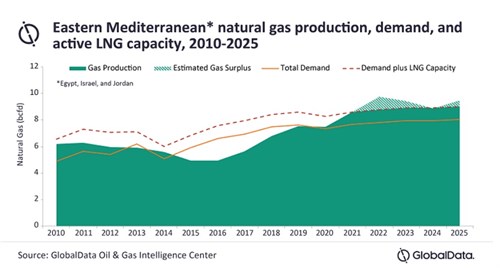COVID-19 could force constrained Eastern Mediterranean gas production until 2023
Eastern Mediterranean regional gas demand has been suppressed and LNG spot prices have been crippled by the impacts of COVID-19 in the first half of 2020. The longer lasting impacts are likely to weaken the demand outlook, which could force reduced gas output from the region until 2023, according to GlobalData.
Daniel Rogers, Oil and Gas Analyst at GlobalData, comments: “Major gas fields including Zohr and Tamar have constrained production in light of diminished domestic demand and an unfavorable LNG market.”
Weak demand and spot prices have curbed LNG exports out of Egypt throughout April, May, and June this year. In addition, the reduced regional demand has constrained gas output and instigated downward revisions of Israel’s forecast gas sales volumes.

Rogers continues: “The 2020 downturn combined with the wider economic impact of COVID-19 have significantly reduced the regional demand growth outlook. With Zohr and Leviathan potentially ramping up to capacity and additional volumes coming from Karish, we could see the region’s gas surplus exceeding export capacity for a number of years. This would mean continued production constraints, likely on the major producing fields, though this could be mitigated if partners can agree to re-start the Damietta LNG plant.
“In the short term, the key gas producers in the region – the likes of BP, Eni, Shell, and Delek are facing weakened LNG spot prices and gas production curtailments. While over the longer term, the lack of active LNG export capacity and muted domestic consumption could prove problematic for recent entrant Chevron and Israeli focused Energean.”

- RWE strengthens partnerships with ADNOC and Masdar to enhance energy security in Germany and Europe
- TotalEnergies and Mozambique announce the full restart of the $20-B Mozambique LNG project
- Venture Global wins LNG arbitration case brought by Spain's Repsol
- KBR awarded FEED for Coastal Bend LNG project
- Norway pipeline gas export down 2.3% in 2025, seen steady this year



Comments